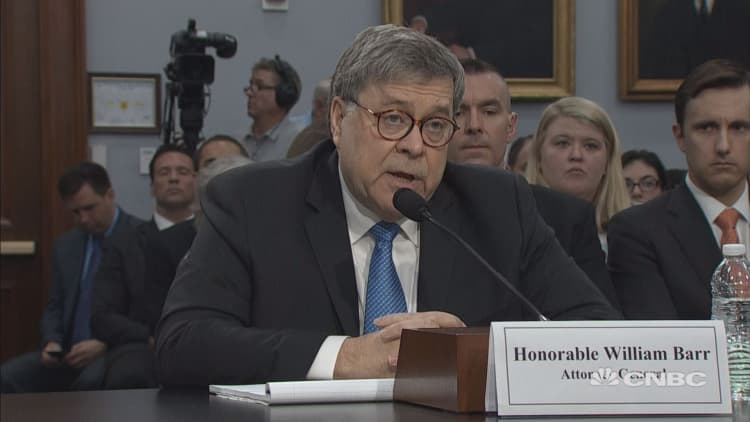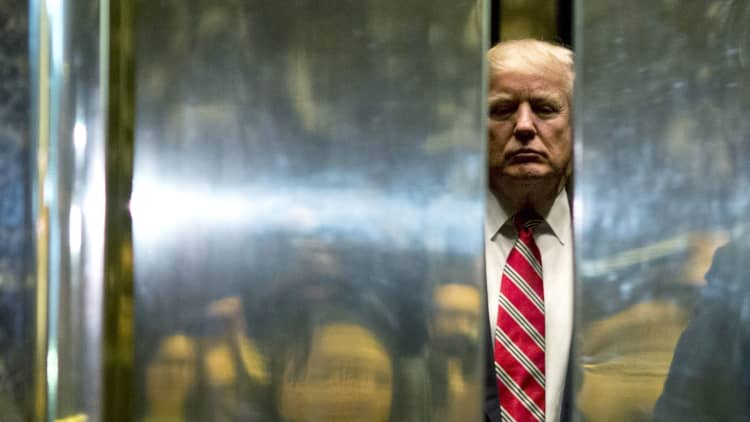
Attorney General William Barr said Tuesday that the Justice Department will release a version of special counsel Robert Mueller's Russia report with redactions "within a week."
Barr, who oversaw the tail end of Mueller's probe of Russian interference and possible collusion with the Trump campaign during the 2016 presidential election, set that deadline during testimony before a House Appropriations subcommittee.
"I think that from my standpoint, within a week I will be in a position to release the report to the public," Barr said during the hearing, which was primarily intended to focus on the fiscal 2020 budget.
Barr has faced a high-pressure campaign from Democrats to release the nearly 400-page Russia report to Congress without redactions. That pressure only intensified after Barr and Deputy Attorney General Rod Rosenstein released a four-page summary of that report's principal conclusions less than 48 hours after the report was delivered to the Justice Department on March 22.
Mueller's report did not establish collusion between the Trump campaign and Russia, and made no determination about whether President Donald Trump himself obstructed justice, according to the summary. Barr and Rosenstein concluded, however, that Mueller did not find sufficient evidence to merit an obstruction charge.

Barr's opening statement did not mention the Mueller report. He focused instead on the Trump administration's $29.2 billion budget proposal for fiscal 2020.
Barr highlighted four of the Justice Department's main priorities: combating violent crime; enforcing immigration laws; fighting "the scourge of illegal drugs," especially the opioid crisis; and protecting the country against national security threats, including cyberattacks.
But Democrats on the subcommittee, including its chairman, Rep. Jose Serrano of New York, immediately asked Barr about Mueller's report.
"We could not hold this hearing without mentioning the elephant in the room, and I'm not referring to my colleagues on the other side," Serrano said.
"The American people have been left with many unanswered questions, serious concerns about the process by which you formulated your letter, and uncertainty about when we can expect to see the full report," Serrano said.
Rep. Nita Lowey, D-N.Y., chairwoman of the House Appropriations Committee, was more blunt: "Before getting into your budget request, I want to address a serious oversight matter," she said referring to "your unacceptable handling of special counsel Robert Mueller's report."
She criticized Barr for the quick turnaround time between the hefty report's delivery and the release of the brief summary, which she said "seems to cherry-pick from the report" and is arguably "more suspicious than impressive."
Barr said in response that "the thinking of the special counsel was not a mystery to the Department of Justice prior to the submission of the report," since there had been prior discussions with Mueller. "So we had an inkling as to what was coming in our direction," he added.
Barr has spelled out four categories of redactions he plans to make before sharing the Mueller report, including information related to Mueller's grand jury and information related to ongoing investigations.
During the hearing Tuesday, Barr said that those redactions will be color-coded depending on which of the four areas they fall under.
Republicans on the panel also questioned Barr about whether the DOJ will be investigating the origins of the government's Russia probe, which Trump has long described as a "witch hunt." The subcommittee's ranking member, Rep. Robert Aderholt, R-Ala., asked Barr about the use of a salacious and unverified dossier in the pursuit of surveillance warrants.
Barr said the department's Office of Inspector General has a pending investigation of the legal processes under the Foreign Intelligence Surveillance Act, or FISA, which was used by the FBI to obtain surveillance warrants.
Correction: Rep. Robert Aderholt is a Republican from Alabama. An earlier version misstated his party affiliation.


